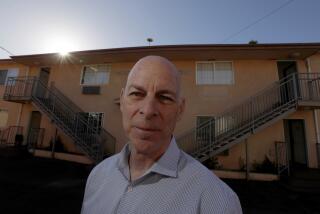Failing Homefed’s CEO Got $1.2 Million for Six Months’ Work : Thrifts: Thomas Wageman’s compensation package in 1991 included a $859,366 relocation benefit.
- Share via
SAN DIEGO — Thomas Wageman, hired last summer to guide Homefed Bank out of trouble, was paid $1.2 million for six months of work, placing him among the state’s most highly compensated executives in 1991.
The cash compensation paid to Wageman, who joined the San Diego thrift in July as president and chief executive, included $859,366 for the sale of his Dallas home to Homefed, a relocation benefit that was a condition of his taking the Homefed job.
The controversial sale, which was reported in The Times in March and detailed in Securities and Exchange Commission filings Thursday, was criticized because of its size and because Wageman did not relocate but instead bought another house in Dallas.
Bert Ely, an Alexandria, Va.-based S&L; consultant, said Wageman had “overreached” with his employment compensation package.
“The bottom line is, this is excessive,” Ely said. “Wageman has kind of bamboozled them all. This has to be a real embarrassment for all concerned, for regulators and the board. Whoever was in the chain of approval has to feel embarrassed.”
The relocation payment was worth more than double Wageman’s $377,653 salary for the last six months of 1991. Homefed paid him $1,125,789 for his Dallas home--the figure he contended was his total cost--when its appraised value was $605,000, according to the SEC filing. Homefed sold it for $615,000, absorbing a half-million dollar loss on the deal.
Wageman paid $647,000 for the Dallas house in 1987, but he had done “extensive remodeling” to the property by the time he sold it to Homefed last fall, a spokeswoman for the thrift said Thursday. The thrift also agreed to pay Wageman’s $338,599 tax liability from the transaction.
Wageman was enjoying the windfall as Homefed’s finances deteriorated. The thrift lost $807.7 million last year, including $521.3 million in the second half, when Wageman was in charge. In the first quarter of 1992, Homefed reported a profit of $30.7 million.
Even that improvement was not enough to rescue the thrift, which failed to raise needed private-sector capital. Regulators last month announced that they will sell Homefed in a federally assisted transaction later this year.
Graef Crystal, an adjunct professor at UC Berkeley Business School who is an expert on executive compensation, described the payment to Wageman as “bizarre.”
“It’s disguised compensation, the equivalent of what other companies would term a front-end bonus,” he said. The negative reaction to the transaction wouldn’t have occurred “if they would have just announced it at the outset” when Wageman was hired last July, he said.
Wageman, taking “personal time off” Thursday, was unavailable for comment.
Homefed Chairman Kim Fletcher said the board of directors knew before hiring Wageman that the purchase of his house would involve a “sizable amount,” adding that Wageman’s remodeling costs were verified in a report by consulting firm of Arthur Andersen & Co.
“The cost was a little larger than what we had anticipated, but it was part of the deal and you don’t back off on the deal,” Fletcher said.
Companies often agree to purchase the homes of newly hired executives as a recruitment lure. The rationale is that it frees the executives from worrying about real estate so they can focus on their jobs.
Eric Shand, regional director of the Office of Thrift Supervision, who approved Wageman’s hiring, described his total compensation as “not out of line” and a “cost of doing business.” While regulators did not know the precise cost of buying Wageman’s house, they did know it would be a “significant figure,” Shand said.
“Homefed was a large S&L; and facing significant problems that needed to be worked out,” he said. “Banks in those situations find it difficult to recruit and attract top talent, so consequently they have to pay up to purchase the talent to fix the problem.”
A banking consultant who asked not to be identified said Wageman’s compensation was typical of “casket cases like Homefed.”
“People coming in insist on large bullet payments up front that take various forms, although this form is unique in my experience,” the consultant said. “It gets down to what do you have to pay for an undertaker. In this mortuary, you have got to pay up front.”
More to Read
Inside the business of entertainment
The Wide Shot brings you news, analysis and insights on everything from streaming wars to production — and what it all means for the future.
You may occasionally receive promotional content from the Los Angeles Times.










